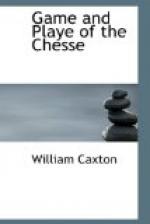It is not, therefore, surprising to learn that Jacques de Cessoles found texts for sundry sermons on the game that formed so favourite a diversion of clergy and laity. The favour with which these discourses were received no doubt gratified the worthy Dominican father. At the request of some of those who heard them he began to write down the substance of his sermons. The result was the “Liber de moribus Hominum et officiis Nobilium ac Popularium super ludo scachorum,” which immediately attained great popularity. This is shown by the bibliography of Dr. A. Van der Linde in a striking manner, for he has described two hundred codices to be found in the various public libraries of Europe.[16]
The difficulties in the way of forming any clear conception as to the life and personality of Cessoles, Ferron, and De Vignay are well shown in an article by M.C. Leber.[17] Dr. Ernst Koepke, who has reexamined the evidences as to Cessoles, holds that he was a Lombard.[18]
The chief source from which Cessoles took his material was the treatise “De Regimine Principum” of Egidius Romanus.
He was of the great Neapolitan family of the Colonna, and his Christian name appears to have been Guido, but his designations have undergone some curious transformations. Born at Rome, 22nd Sept., 1216, Guido Colonna went at an early age to Paris, where, from the name of his birthplace, he became known as AEgidius Romanus, with the French form of Gilles de Rome. He was an ardent and enthusiastic disciple of St. Thomas Aquinas, and his familiarity with that great doctor of the Church led him to desire admission to the Dominican order, but a difficulty intervened from the circumstance that he had already contracted ties which bound him to the order of St. Augustine. To this untoward accident may probably be attributed no little of the extension of the philosophical doctrine of Aquinas; for Colonna, unable or unwilling to be relieved of the vows that bound him to the Augustinians, preached eagerly amongst them the Thomist speculations of his friend and master. In the controversy with the Franciscans, those whom he had indoctrinated were valuable allies to the Thomists, for their aid, coming from an independent organization, appeared to carry the weight of impartiality, and to be unassailable on the plea of partisan interest. In the year 1287 there was a general convocation of the order of St. Augustine at Florence, and at this assembly it was decreed that the doctors of the order should teach in conformity with the decisions arrived at by Colonna. To him is largely due the success of the Thomist scheme, of which he was an able, persistent, and vigorous exponent. Many tracts by him remain in print and MS. on these subjects. The fame he had thus acquired gained him the name of doctor fundamentarius and doctor fundatissimus. His lectures at Paris attracted to him the attention of Philippe le Hardi, who thought him a fitting person to be entrusted




